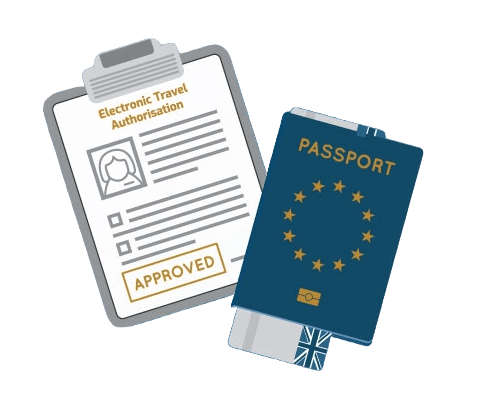
We’re here to help you understand travel requirements for entering South Korea. Cloudvisas simplifies the process of applying for the South Korea ETA. You can use the form below and get started on your application. We will then handle the rest of the processing from there and keep you informed throughout the stages.
Get started on your application
Applying for the South Korea ETA
What is the South Korea ETA?
The South Korea ETA can be used for purposes including tourism, business, or transit.
Who can travel on the South Korea ETA?
Passport holders of the following countries can apply for the South Korea ETA without requiring a visa from another country as a contingency: Albania (30 Days), Andorra (30 Days), Antigua and Barbuda (90 Days), Argentina (90 Days), Australia (90 Days), Austria (90 Days), Bahamas (90 Days), Bahrain (30 Days), Barbados (90 Days), Belgium (3 Months), Bosnia and Herzegovina (30 Days), Botswana (90 Days), Brazil (90 Days), Brunei (30 Days), Bulgaria (90 Days), Canada (6 Months), Chile (90 Days), Colombia (90 Days), Costa Rica (90 Days), Croatia (90 Days), Cyprus (30 Days), Czech Republic (90 Days), Denmark (90 Days), Dominica (90 Days), Dominican Republic (90 Days), Ecuador (90 Days), El Salvador (90 Days), Estonia (90 Days), Eswatini (30 Days), Fiji (30 Days), Finland (90 Days), France (90 Days), Germany (90 Days), Greece (3 Months), Grenada (90 Days), Guam (90 Days), Guatemala (90 Days), Guyana (30 Days), Haiti (90 Days), Honduras (30 Days), Hong Kong (90 Days), Hungary (90 Days), Iceland (90 Days), Ireland (90 Days), Israel (90 Days), Italy (90 Days), Jamaica (90 Days), Japan (90 Days), Kazakhstan (30 Days), Kiribati (30 Days), Kuwait (90 Days), Latvia (90 Days), Lesotho (60 Days), Liechtenstein (3 Months), Lithuania (90 Days), Luxembourg (3 Months), Macao (90 Days), Malaysia (3 Months), Malta (90 Days), Marshall Islands (30 Days), Mauritius (30 Days), Mexico (3 Months), Micronesia (30 Days), Monaco (30 Days), Montenegro (30 Days), Morocco (90 Days), Nauru (30 Days), Netherlands (3 Months), New Caledonia (30 Days), New Zealand (3 Months), Nicaragua (90 Days), Norway (90 Days), Oman (30 Days), Palau (30 Days), Panama (90 Days), Paraguay (30 Days), Peru (90 Days), Poland (90 Days), Portugal (90 Days), Qatar (90 Days), Romania (90 Days), Russia (60 Days), Saint Kitts and Nevis (90 Days), Saint Lucia (90 Days), Saint Vincent and the Grenadines (90 Days), Samoa (30 Days), San Marino (30 Days), Saudi Arabia (30 Days), Serbia (90 Days), Seychelles (30 Days), Singapore (90 Days), Slovakia (90 Days), Slovenia (90 Days), Solomon Islands (30 Days), South Africa (30 Days), Spain (90 Days), Suriname (3 Months), Sweden (90 Days), Switzerland (3 Months), Taiwan (90 Days), Thailand (90 Days), Tonga (30 Days), Trinidad and Tobago (90 Days), Tunisia (30 Days), Turkey (90 Days), Tuvalu (30 Days), United Arab Emirates (90 Days), United Kingdom (90 Days), United States (90 Days), Uruguay (90 Days), Vatican City (30 Days), Venezuela (90 Days)
Who does not need the South Korea ETA?
All travellers will require a travel authorization to enter South Korea by air or sea for tourism, business, or transit purposes.
How many days are allowed?
Eligible passport holders are permitted to visit South Korea for days. Multi-entry South Korea ETA options are available.
How long is the South Korea ETA valid?
The authorization is usually issued for 3 years. This can vary depending on your passport expiry date as well as the type of ETA or eVisa you apply for.
What is the processing time for the South Korea ETA application?
The processing timeline is typically 3 days, although it is advised travelers allow extra time for any processing delays that may occur for South Korea to approve their South Korea ETA request.
What do I need to apply for the South Korea ETA?
Most all travel authorizations such as the South Korea ETA, will require a passport with at least six months validity remaining. You should also have the information on-hand of your booked or potential itinerary, including arrival and departure dates, as well as accommodation details.
What are the options for applying?
Currently, there are no other variants of the South Korea ETA.
What if I want to apply on my own?
You can apply directly by vising the following:
Paying for the authorization
What are the fees for applying?
The government fees are currently 10000 KRW yet are subject to change without notice. Our fees for processing your application are calculated and displayed at checkout.
Are the fees refundable?
Both government and service fees are required to be paid prior to submitting the application. The government fee is non-refundable. The service fee is refundable in the event the application is unsuccessful.
Using the South Korea ETA
What entry modes do I need the South Korea ETA?
The South Korea ETA is needed to enter South Korea by air or sea.
Do I need travel insurance to enter South Korea?
Travel insurance is not required to travel on the South Korea ETA.
Whether or not travel insurance is required, we recommend frequent travelers to purchase a multi-trip travel insurance policy that includes Worldwide Coverage, as this allows you to use a single policy that covers all your trips. Bear in mind coverage restrictions on certain destinations and activities as well as coverage limits, terms and conditions.
Is it possible to extend a visit to South Korea on the South Korea ETA?
Extensions of the South Korea ETA are not possible.
Applying for the South Korea ETA with CloudVisas
Applying for the South Korea ETA is simple with us. It entails the following steps:
- Documentation: Ensure you have your passport, booking itinerary or potential itinerary available as well as the contact information of individuals, businesses or organizations you will stay with or interact with during your stay in South Korea.
- Application Form: Once you have your documents, the next step is to complete the application form for your selected travel authorization. Ensure you provide accurate information on the form, including biometrics, contact, personal, family, occupational, itinerary and other requested information.
- Supporting Documentation: As and when requested, upload copies of the necessary documents. Ensure your documents are in the correct and acceptable format for uploading. Also ensure the entire document is visible with key information easily readable. The information must match that of each of the applicants.
- Receive Your e-Visa: If your application is approved, your South Korea ETA will be emailed to the address used on your application within 3 days or less. Your authorization will be electronically linked to your passport, however, travelers are advised to print out a copy of their authorization and / or download any necessary mobile applications to display their South Korea ETA to authorities at the border, should they be requested to provide proof on arrival or departure to South Korea.
Restrictions on traveling on the South Korea ETA
Travelers with an approved South Korea ETA are subject to the following restrictions.
Permitted Entry Ports: The authorization allows you to enter only via approved air, land or sea ports. Entering through ports that are not approved for this type of authorization may result in denial of entry.
Working on the South Korea ETA: The South Korea ETA cannot be used for work purposes, unless explicitly authorized through another program or visitor work scheme.
Immigrating on the South Korea ETA: The South Korea ETA cannot be used for immigrating or establishing residency. If you wish to reside on a long-term basis, you will need to apply for the relevant South Korea visa.
Passport validity: Your passport must be valid for at least 6 months prior to submitting your application for the South Korea ETA. You must travel on the passport that you use for your application. Should your passport have less than 6 months validity prior to expiry, you should consider obtaining a new passport prior to applying for the South Korea ETA.
Multiple citizenships: You must disclose all citizenships you hold on your South Korea ETA application. Not disclosing these citizenships may result in a denial of your application.
Accompanying minor children: Parents or guardians traveling with minor children may be asked for documentation at the border, and during the South Korea ETA process. Parents or guardians should ensure they carry sufficient documentation to provide proof of their relationship to the minor traveler.
Approved points of entry on the South Korea ETA
The South Korea Electronic Travel Authorization (K-ETA) allows eligible travelers to enter the country without a visa for short-term stays. Visitors must hold a valid K-ETA before boarding their flight or vessel to South Korea. While travelers can arrive through various entry points, immigration authorities will verify K-ETA approval upon arrival. Those who fail to obtain a K-ETA before traveling may be denied boarding or entry.
Upon arrival, travelers must present their passport and K-ETA approval confirmation to immigration officers. Additional screening may be required based on the traveler’s nationality, trip purpose, or previous visits to South Korea. Ensuring all documentation is in order before travel helps facilitate a smooth entry process.
Permitted Airports
South Korea boasts several international airports that serve as key gateways to various regions across the country
Land Border Crossings
South Korea does not have any land border crossings accessible to international travelers. The country shares its only land border with North Korea, which remains closed to general travel due to strict military and security regulations. The Korean Demilitarized Zone (DMZ) acts as a buffer between the two nations, preventing civilian movement across the border.
While there are checkpoints and observatory sites within the DMZ, they are not open for regular entry or exit into South Korea. These locations, such as Panmunjom (Joint Security Area – JSA) and Dorasan Checkpoint, serve diplomatic, military, and tourism purposes rather than functioning as immigration entry points. Travelers visiting these areas must join approved guided tours and cannot use them as a means of crossing between countries.
Since land entry into South Korea is not permitted, all international travelers must arrive by air or sea. Those planning to visit should ensure they have a valid K-ETA or an appropriate visa before arrival to avoid any travel disruptions.
Permitted Seaports
South Korea’s strategic location and extensive coastline have fostered the development of several significant seaports, each playing a vital role in international trade and transportation. Below is a table highlighting some of the major seaports, their locations, and notable features:
Financial sufficiency requirements for entering South Korea
Travelers visiting South Korea must demonstrate financial stability to cover their stay, whether for tourism, business, or transit. While the government does not specify a fixed amount, immigration officers may request proof of sufficient funds upon arrival. This verification helps prevent issues such as overstaying or unauthorized employment.
Proof of Financial Means
Although not all travelers will be asked to provide proof of funds, those arriving on a K-ETA or short-term visa should be prepared to show financial documents. Acceptable proof includes:
- Bank Statements: A copy of bank statements from the last three to six months, showing regular income and a sufficient balance to cover expenses.
- Proof of Employment: A letter from an employer confirming job status, position, and salary may strengthen an applicant’s credibility.
- Income Tax Returns: Some immigration officers may request a copy of recent tax filings as additional proof of financial standing.
- Sponsorship Letter (if applicable): If a host in South Korea is covering your expenses, they should provide a signed letter with supporting financial documents.
Minimum Financial Expectation for Travelers
Although South Korea does not mandate a specific minimum amount, many travelers are advised to have at least KRW 100,000 to KRW 150,000 (approximately USD 75–115) per day of their stay. This amount should cover accommodation, meals, local transportation, and other expenses. Immigration officers may assess whether a traveler has enough funds based on their itinerary, duration of stay, and accommodation plans.
Business travelers or visitors staying for an extended period may be expected to have a higher amount, especially if they do not have prepaid accommodation. Having prepaid hotel bookings and flight tickets may also help confirm a traveler’s financial readiness.
Currency Declaration Rules
South Korea enforces strict foreign currency declaration laws to prevent money laundering and financial crimes. Travelers bringing in more than USD 10,000 (or equivalent in foreign currency) must declare the amount to customs upon arrival.
Failure to declare excess currency may result in:
- Fines or penalties depending on the undeclared amount.
- Seizure of funds if the source of money is deemed suspicious.
- Possible delays at immigration and customs clearance.
Local laws impacting tourists or business travelers
Understanding South Korea’s laws can help travelers avoid legal issues and unnecessary fines. The country has strict regulations in areas like public behavior, identification, and controlled substances. Below are key legal aspects all visitors should be aware of.
Identification and Immigration Compliance
- Carry Your ID at All Times: Police conduct random ID checks, travelers must carry their passport or ARC (Alien Registration Card) at all times. Failure to present valid identification may result in detention or fines.
- Visa and K-ETA Requirements: Entry rules change frequently, and travelers should verify visa or K-ETA requirements before departure. Visitors who overstay their permitted period can face fines, deportation, or entry bans.
Public Behavior and Social Conduct
- No Public Intoxication or Disorderly Conduct: While alcohol is widely available, public drunkenness and disruptive behavior can lead to arrest or fines.
- No Smoking in Public Areas: Smoking is prohibited in restaurants, parks, bus stops, and near public buildings. Violators can face fines of up to 100,000 KRW. Designated smoking areas are available in most cities.
- Protests and Demonstrations: Foreigners are not allowed to participate in political protests or demonstrations. Engaging in political activities may lead to deportation.
Strict Drug Laws
- Zero-Tolerance Policy: South Korea has some of the strictest drug laws in the world. Possession, use, or trafficking of illegal substances, including marijuana and prescription drugs without proper documentation, can lead to imprisonment or deportation.
- Overseas Drug Use Can Be Penalized: South Korean law applies beyond its borders, citizens and foreigners with residency status can be prosecuted for drug use even if consumed outside of Korea.
Aviation Safety and Restricted Items
- Maximum of 5 portable batteries (100 watt-hours each) per passenger.
- Batteries over 160 watt-hours are banned.
- No charging power banks onboard.
Why It Matters: These laws were introduced after a battery fire incident on an Air Busan flight in 2025. Violators may have their devices confiscated.
Tourism Restrictions and Local Curfews
- Tourists are banned from entering between 5 p.m. and 10 a.m.
- Fines of up to 100,000 KRW apply for violations.
Respecting Local Laws and Avoiding Legal Trouble
- No Unauthorized Photography: Avoid taking pictures of military sites, government buildings, and strangers without consent.
- Littering and Environmental Fines: Littering is strictly prohibited and can result in fines of up to 300,000 KRW.
- Cultural Sensitivity: Avoid making negative comments about Korean history, politics, or North Korea, as these topics can be sensitive.
Cultural Information about South Korea
Understanding South Korea’s cultural norms can help travelers navigate social situations smoothly and avoid misunderstandings. While the country is modern and globally connected, respect for traditions and etiquette remains essential.
Essential Social Etiquette
- Bowing: A slight bow is the standard greeting, but handshakes are common in business settings. When shaking hands, use both hands to show respect.
- Two-Handed Gestures: Whether handing over money, receiving a gift, or pouring drinks, always use both hands as a sign of politeness.
- Silence in Public Transport: Speaking loudly on subways, buses, or trains is considered rude. Keep conversations quiet and avoid phone calls.
- Respect for Elders: Age hierarchy is highly important in Korean culture. Give up your seat for older passengers and address elders with formal language.
- Personal Space & Touching: Unlike in some cultures, hugging or touching someone casually is uncommon unless you have a close relationship.
Dining and Drinking Culture
- Waiting to Eat: It’s polite to wait until the eldest person at the table begins eating before you start.
- Chopstick Etiquette: Never stick chopsticks vertically into rice, this resembles a funeral ritual. Place them on the side when not in use.
- Sharing Food: Korean meals often include shared dishes. Don’t hesitate to use serving utensils rather than personal chopsticks when taking food from communal plates.
- Drinking Etiquette: When receiving a drink, hold the glass with both hands and turn slightly away when drinking in front of elders.
Dress Code & Public Behavior
- Modest Clothing: While short skirts and shorts are common, low-cut tops may attract unwanted attention. Conservative dress is preferred in professional or religious settings.
- Public Displays of Affection: Holding hands is fine, but kissing or excessive physical contact in public is uncommon and may draw stares.
- Shoes Off Indoors: Whether in a traditional restaurant, temple, or home, remove your shoes before entering. Some guesthouses may also require this.
Tipping & Payment Customs
Cashless Payments: Mobile payments like KakaoPay and credit cards are widely used, but some small shops prefer cash.ons and show respect for the local culture.
No Tipping: South Korea does not have a tipping culture. Leaving tips at restaurants or taxis may confuse locals.
Travel Information about South Korea
For travelers visiting South Korea, having key travel details in mind can enhance the overall experience. Below are essential aspects to consider when planning your trip.
Entry Requirements
- Passport Validity: Ensure your passport is valid at the time of entry. Some nationalities may need six months of validity beyond the departure date.
- Visa & K-ETA: From April 1, 2023, to December 31, 2025, travelers from certain countries, including the U.S., Australia, and New Zealand, do not need a K-ETA for short stays. Other nationalities should verify their visa requirements before departure.
Transportation
- Public Transit: South Korea’s subway systems in Seoul, Busan, Daegu, and Incheon are efficient, affordable, and offer English-language signs for easy navigation.
- Taxis & Ride Apps: Taxis are widely available and reasonably priced. Apps like Kakao Taxi and Tada allow cashless transactions and English-language booking.
- KTX (Bullet Train): The high-speed KTX train connects Seoul to Busan in about 2.5 hours, making long-distance travel fast and convenient.
Accommodation Options
- Hotels & Guesthouses: South Korea offers a range of accommodations, from budget hostels to luxury hotels in major cities like Seoul and Busan.
- Capsule Hotels: A popular choice for solo travelers, these compact accommodations offer affordable, high-tech sleeping pods.
- Temple Stays: Experience a Zen retreat at Buddhist temples, where guests can meditate and participate in temple activities.
Internet & SIM Cards
- Free Wi-Fi: Widely available in cafés, subway stations, and public spaces, making connectivity easy for travelers.
- SIM & eSIM Options: Short-term travelers can purchase prepaid SIM cards or rent portable Wi-Fi routers at major airports. Providers like SK Telecom and KT offer reliable data plans
Emergency Contacts
- Police: 112
- Tourist Helpline (24/7, English Support): 1330
- Fire & Medical Emergencies: 119
Additional travel considerations
- Check your eligibility before applying
- Never overstay on the South Korea ETA
- Apply in advance
- Travel with same passport
- Travel with copy of authorization
Get started on your application
Why use CloudVisas?
We are a technology first, application assistance and processing company that is committed to offering a superior level of service compared to embassies or governments. Our focus is on achieving the highest level of customer satisfaction.

Experience
With years of experience in online visa services, we recognize the complexities and challenges. Our team provides swift, friendly, and expert assistance to make the process as seamless as possible. We help reduce errors and expedite applications to result in a better outcome for our customers.

Simplicity
Is to be the primary go-to provider of streamlined visa services for individuals and businesses who lack the time or resources to figure out the application process themselves. Our aim is to eliminate the confusion and stress commonly associated with visa or electronic travel authorization application processes by utilizing technology and the power of our dedicated customer services team.

Value
Here’s why we are selected by travelers:
• 24/7 Support from real humans, not AI
• Pre-Submission Application Review
• Free Resubmissions for mistakes or updates
• PDF Confirmations for ease of record keeping
• Lifetime Retrievals of your approvals
• Refunds when applications are denied

